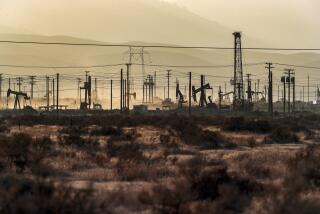Panel Votes Final OK of 3 Offshore Exxon Rigs
- Share via
The California Coastal Commission on Tuesday approved a big offshore oil development in the Santa Barbara Channel but affirmed that it opposes opening up the state’s northern coast to oil exploration.
Voting 8 to 1, the commission gave Exxon Corp. the final government approval it needs to build the $2.5-billion Santa Ynez offshore oil project. The action clears the way for construction to begin on three platforms by spring.
Earlier in the day, the commission held a public hearing on Lease Sale 91, the proposal to open 1.1 million acres of the outer continental shelf off Mendocino and Humboldt counties to oil exploration. Lease Sale 91 is part of the Interior Department’s five-year plan to explore and develop offshore petroleum reserves.
Preparing Comment
The commission, already on record opposing the sale, has until March 12 to file its official comment on the Interior Department’s draft environmental impact statement supporting the proposed sale. The witnesses’ testimony Tuesday will be incorporated in the commission’s comments on the lease sale.
Most of those testifying objected to the federal plan that would allow construction of up to 22 platforms along scenic parts of the Northern California coast. They warned that oil from these platforms would be handled by tankers, rather than pipelines to onshore facilities, thus increasing the hazards of a spill. Opponents say it would be virtually impossible to clean up even a small spill in the rough seas off that coast.
While the law does not give the commission regulatory authority over federal lease sales, the body does have the authority to regulate the environmental impacts of oil and gas exploration and development in federal waters. Because of this, the commission’s official comments on the environmental statement are considered important.
“There is nothing in the (statement) to lead me to change my vote against 91,” Commissioner Madelyn Glickfeld said, adding that it “trivializes the environmental impacts of this project on the coast.”
Exxon was given the final regulatory green light for its Santa Ynez project Tuesday morning, after five years of controversy over how to mitigate its effects. The commission’s vote was an endorsement of the environmental impact compromise agreement reached in negotiations among the company, Santa Barbara County and the Santa Barbara County Air Pollution Control District.
The Santa Ynez Project, located nine miles off Point Conception, is expected to produce up to 400 million barrels of oil and 700 million cubic feet of natural gas, according to Department of Interior estimates.
Fear of Pollution
Local officials opposed the project initially because it would have increased the county’s air pollution problems. Diesel-fueled electric generators on the platforms, combined with air pollution from offshore oil storage and treatment facilities, would have emitted an estimated 1,131 tons of nitrogen oxide a year, plus hydrocarbons and other smog-producing pollutants, officials said.
In the compromise negotiated by the county and the air quality control district, Exxon has agreed to reduce these emissions at least by half. To do this, the company will build onshore generators and will electrify the platforms by undersea cable. It will also build an onshore petroleum storage and treatment facility rather than use the storage and treatment ship that now processes oil from Exxon’s Platform Hondo. This ship will be replaced by the onshore facilities.
The new 49-megawatt co-generation plant and the storage and treatment facility to be built in Las Flores Canyon will cost about $400 million, company officials said. Both will utilize advanced technology to reduce air pollution.
While each of the three $100-million platform skeletons are being built in Korea, Exxon has agreed to let U.S. companies bid on building the “top sides,” referring to the equipment and living quarters atop the platform. In the past, several commissioners criticized companies such as Exxon for contracting the platform construction work out to overseas companies.
More to Read
Sign up for Essential California
The most important California stories and recommendations in your inbox every morning.
You may occasionally receive promotional content from the Los Angeles Times.










